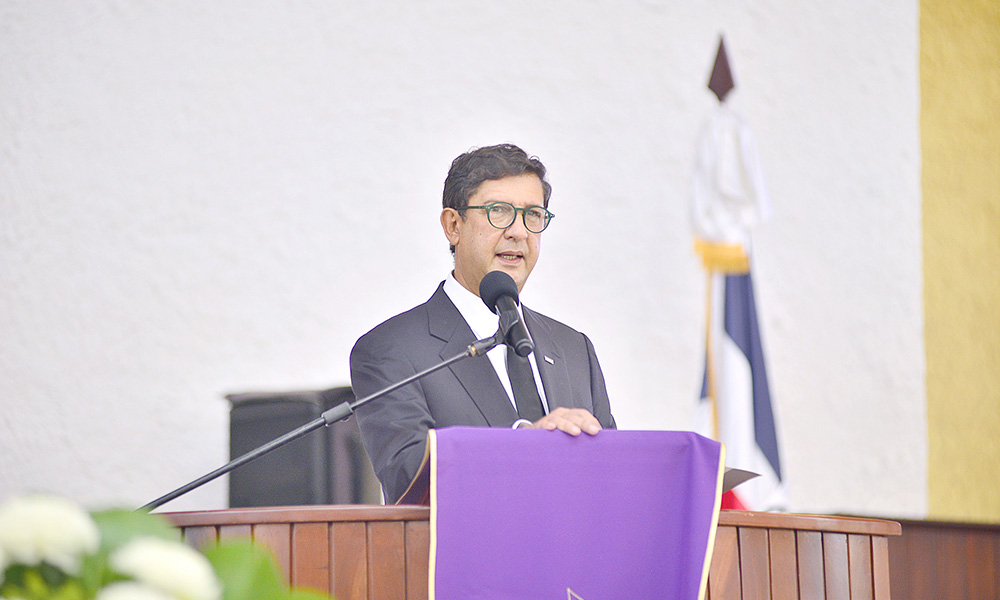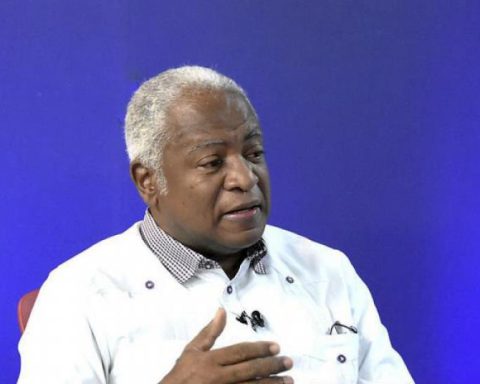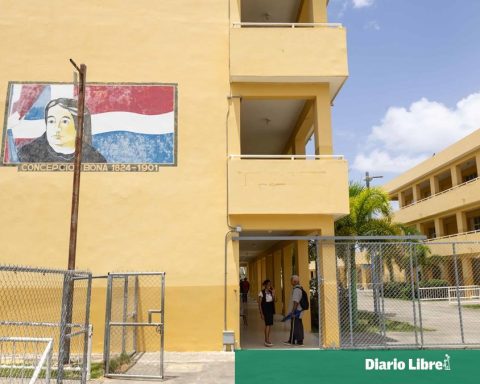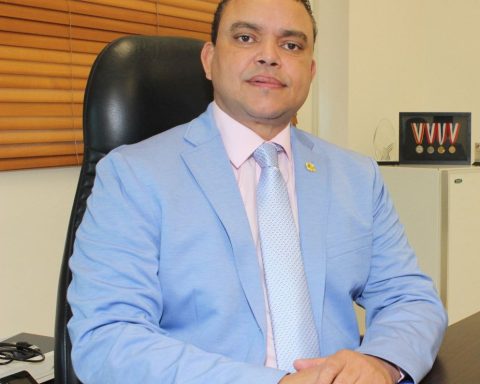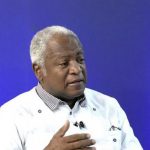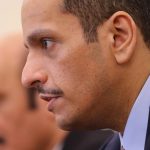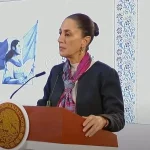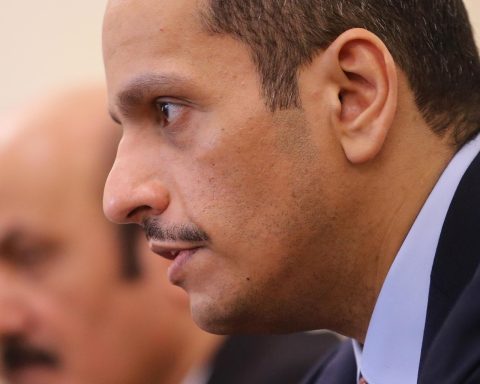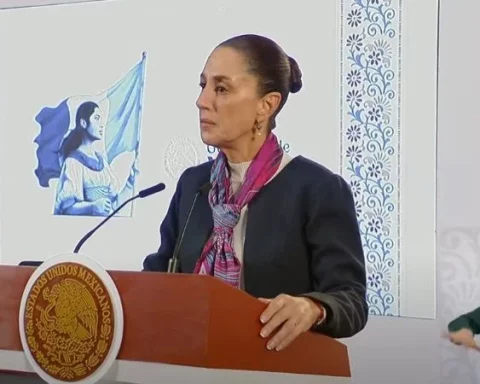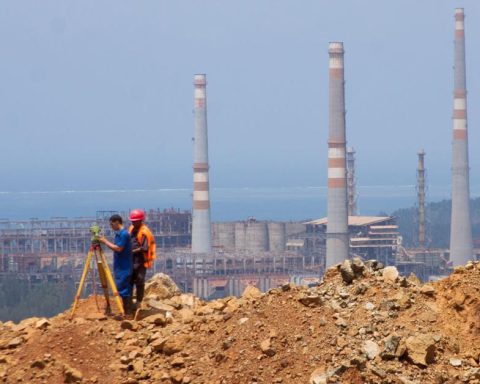With enormous regret, I fulfill the sad duty of bidding farewell to the mortal remains of Monsignor Agripino Núñez Collado: priest, Rector, adviser, brother and friend.
In his multifaceted life, this extraordinary human being stood out above all in his roles as religious, educator and mediator.
This magnificent and enriching man had a deep religious faith.
Without that iron faith it would not have been possible for him to overcome the obstacles that he necessarily had to overcome to fulfill his role on earth.
Where he was parish priest, and managed the two university parishes for more than 20 years, he carried out pastoral work that was reflected, for example, in how his parishes were filled at Sunday mass, mainly with young people he recruited through Youth Ministry.
He maintained the daily custom of the holy rosary, together with his domestic collaborators Fatima, José Ramón and Juan in Santiago, Fernanda and Antonio in Santo Domingo.
He cultivated reflection by reading the Confessions of Saint Augustine, was devoted to Saint Francis of Assisi and was constantly accompanied by a New Testament, which he read and reread in all his breaks.
But his pastoral mission was not that of being a parish priest: it was education and mediation.
As an educator, of course his great work was this University. He worked from sunrise to sunset and from moon to moon, obsessed with the self-imposed mission of making the best higher education center in the Dominican Republic.
And he achieve it!
His greatest pride was the PUCMM graduates, who are now more than 100,000, and the impact that these graduates have on national life.
He used all his intelligence, which he had left over, to create a university for the academic elites, but with the enormous social plan of the Educational Credit, which allowed the poorest to have access to the best education.
I am an example of the thousands who were able to study in this luxurious university thanks to the Educational Credit program.
That’s why I had and will always have a canine gratitude.
In his role as mediator, he is credited with having created the culture of dialogue.
From the emblematic tripartite dialogue in the mountains of Jarabacoa to the Economic and Social Council, these have been the scenarios where consensuses have been built that have allowed not only the labor and social peace that we still enjoy, but also the strengthening of our institutions.
And as President Abinader told the press this morning, his greatest contribution is not seen, because it was what did not happen thanks to his intervention.
He never aspired to recognition or glory.
His most successful mediations and his greatest political contingencies were never written. That is why Bernardo Vega, while presenting volume 2 of his memoirs, said that a volume 3 was missing.
He preferred to take to the grave those mediations that many times saved the social peace of the country.
He rejected the Honoris Causa doctorate that the Board of Directors of this university justly approved for him, alleging that he had not worked for recognition and that “Christianity is a path that is used and forgotten.”
His philosophy of life was the phrase of Saint Francis of Assisi that he repeated frequently: “work as hard as if it only depended on you, and with as much faith, as if it only depended on God”
Its presence in Santiago has been a blessing for the city and for the region, not only for creating this university, with daily carpentry work, but also because it has been the valid interlocutor, sometimes the only one, between Santiago and the institutions of decision-makers who are based in the capital.
Thanks in large part to his management, the Free Trade Zone Corporation, the Santiago 86 Central American Games, the Cibao International Airport and the Santiago Metropolitan Hospital were created, just to give a few examples.
Monsignor was a real instrument of development for the city, for the region and for the country.
He always maintained his residence here in Santiago, even though most of his obligations were in Santo Domingo.
In his private life he was extremely discreet.
He didn’t even talk about his illnesses with his family.
I have read in the press about “the surprise death” of Monsignor Agripino. The reality is that during the last years his health deteriorated and he had to undergo complicated medical treatments.
From chemotherapy to surgeries.
He never complained. He never got depressed. He minimized everything that seemed difficult.
He fought against his illnesses, with the same strength and the same courage with which he fought all the difficulties and faced all the challenges that life brought him, from his helpless childhood to being one of the main figures of national life.
In his life he showed that he was capable of surviving himself.
His heritage, which legitimately had the fruit of more than 50 years of work, and which was limited to a house that his friends prepared for him and some savings “in case an illness came”, as the disease did come, his heritage, I repeat, He left everything under a notary, to the Polanco Brito Foundation for the exclusive use of the Educational Credit Program, which was his great social work.
So that even in death he will continue to lavish his contribution to the University.
The long and fruitful life of this giant and the result of his achievements will perhaps be judged by future generations with more objectivity and with more justice than what we are doing now.
Hopefully the country does not have the need to miss him.
Dear Monsignor, see you later.
His spiritual children, of whom we are many, will always know how to listen to his unmistakable voice and appreciate his sincere look.
We will never forget his deed, his contribution, his example, his dedication.
Those of us who had the honorable privilege of being his friends will always look to his grave when we need guidance or advice.
His work will remain!!!!
Now, rest in peace!!
